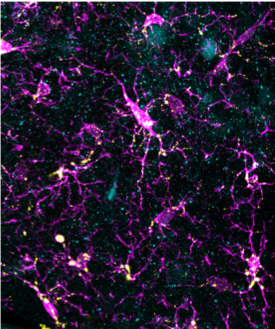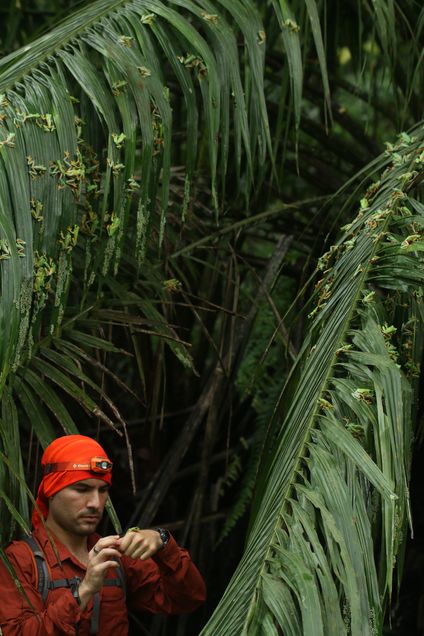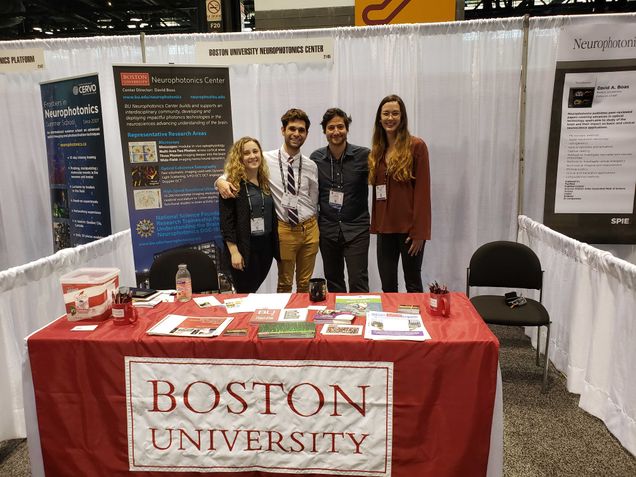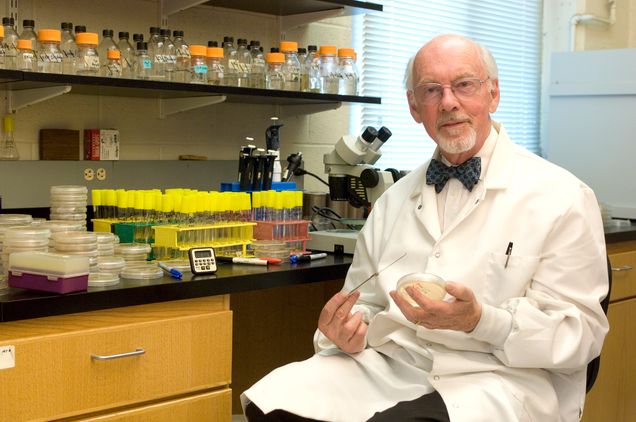Professor Primack Receives Two National Science Foundation Grants
Biology Professor Richard Primack recently received two new National Foundation grants. The first for $242,000, “Phenological mismatch between trees and wildflowers mediated by environmental variability and plant invasions”, builds on the observations of Henry David Thoreau, and is a collaborative grant with colleagues from the Carnegie Museum and the University of Pittsburgh. The second grant for $277,526, titled, “The impacts of changing phenology on species, ecological interactions, and conservation”, is funded the NSF OPUS program, and will involve Primack and his former grad students writing review papers in climate change biology and making their data set publicly available.
Ashley Comer, Dr. Tushare Jinadasa, & Dr. Alberto Cruz-Martín Published in PLOS Biology

GPN PhD student Ashley Comer and Biology Postdoctoral Fellow Dr. Tushare Jinadasa in Alberto Cruz-Martín's Lab recently co-authored an article published in PLOS Biology, "Increased expression of schizophrenia-associated gene C4 leads to hypoconnectivity of prefrontal cortex and reduced social interaction." The article was featured on the January 2020 cover.
Schizophrenia is a debilitating psychiatric disorder characterized by hallucinations, emotional withdrawal and a decline in cognitive function. Comer, Jinadasa and colleagues have found that a highly-associated schizophrenia gene, complement component 4 (C4), plays a direct role in the pathogenesis of disease-relevant phenotypes. Increased expression of the immune gene C4 leads to reduced connectivity of neurons in the medial prefrontal cortex, a brain region with notable gray matter loss in schizophrenia. This disruption in the development of the frontal circuits caused deficits in the social behavior of young mice that persisted into adulthood. Taken together, this finding is important because it reveals a critical window in the development of the prefrontal cortex in which C4 could be therapeutically targeted to alter phenotypes in schizophrenia.
Read the article here.
Heather Hook Recipient of Inaugural Kilachand Doctoral Fellowship

Heather Hook of the Siggers Lab is a recipient of the inaugural Kilachand Doctoral Fellowship. This fellowship is funded by the Multicellular Design Program (MDP), which combines research in Synthetic Biology, Microbial Engineering, Tissue Engineering, Data Science, and Biophysics to understand the design principles of multicellular systems.
Heather’s research is focused on developing a new high-throughput technique, termed CASCADE (Comprehensive Assessment of Complex Assembly at DNA Elements), to precisely profile the effects of single nucleotide variants on the indirect recruitment of transcriptional cofactors to DNA across different cell types and stimulus conditions. Using macrophage nuclear extracts, CASCADE has been used to map the determinants of constitutive and stimulus-dependent recruitment of cofactors to various enhancers and promoters of immune response genes. Furthermore, CASCADE has been used to characterize defective cofactor recruitment at known stimulus dependent GWAS single nucleotide variants (SNPs) implicated in immune diseases.
CASCADE will be used for Heather’s collaborative research project with the Mostoslavsksy lab of the Center of the Regenerative Medicine for her MDP fellowship. The goal of the project is to use CASCADE to identify transcriptional regulators controlling cell fate. Heather plans on following the development of induced pluripotent stem cells (iPSCs) to specific immune cells to identify transcriptional regulatory complexes governing developmental decisions. This work will help establish a new approach to understand and manipulate cellular fates that can be then be applied to more complex cellular differentiation systems.
Congratualtions, Heather!
Fall Semester GSO Travel Grant Winners
Congratulations to Brandon Güell (Warkentin Lab) and Natalie Vaisman (Frydman Lab) for being recipients of Fall 2019 Graduate Student Organization (GSO) Travel Grants! They are two of just ten winners.
Remembering Sir Hans Kornberg
The Department of Biology at Boston University mourns the loss of Sir Hans Kornberg, Professor of Biology and a beloved member of the BU Biology Department for 24 years.
Born in 1928, Hans Kornberg fled to the UK from Nazi Germany at the age of 11. After finding an interest in chemistry, Dr. Kornberg studied in the Krebs Lab at the University of Sheffield and earned his PhD in Biochemistry in 1953. After working in several research labs in the US and the UK and lecturing at Oxford, Dr. Kornberg was a Professor of Biochemistry at the University of Leicester. He was the Sir William Dunn Professor of Biochemistry at the University of Cambridge, and later served as the 34th Master of Christ's College and the Deputy Vice-Chancellor for the University of Cambridge. Upon retirement in 1995, Dr. Kornberg was invited to serve as Director of the Boston University University Professors Program, which he did until the program's end in 2011. In addition to leading the UNI program, he was a Professor of Biology and he taught Biochemistry to undergraduate and graduate students at Boston University for the past 24 years.
He was the recipient of numerous awards and honors. He was appointed Fellow of the Royal Society in 1965, and was knighted in 1978. He holds 11 honorary doctorates and was a Fellow of the American Academy of Microbiology, as well as a Foreign Associate Member of the National Academy of Sciences and American Academy of Arts and Sciences. He received the UK Biochemical Society’s inaugural Colworth Medal and the Warburg Medal of the German Society for Biochemistry and Molecular Biology.
Sir Hans’ research, conducted for over 70 years, was focused on the regulation of carbohydrate transport in micro-organisms. Starting out as a bottle washer for Hans Krebs, Hans Kornberg was an author of over 250 publications. Two of his significant scientific accomplishments were the elucidation of the glyoxylate cycle and the concept and mechanisms of anaplerosis, the former being a cycle used by plants and other non-animals to enable the biosynthesis of biomass from 2-carbon compounds, and the latter being an important mechanism assuring that carbon oxidation by the Krebs cycle can continue by replenishing the intermediates that are drained by various biosynthetic reactions.
Sir Hans will be greatly missed by his colleagues and students. Not just a brilliant biochemist and skilled educator, Dr. Kornberg always had an anecdote or witty story at hand, whether about his friendship with Julie Andrews in his youth or his affinity for Latin wordplay. Visitors to the Kornberg Lab were promptly invited to take part in the most important experiment of all: making coffee! Sir Hans is remembered for his generosity, incredible wit, many stories, endless puns, and cheerful nature.
Sir Hans was the dearly loved husband of Donna and of the late Monica; cherished father of Julia, Rachel, Jonathan and Simon; and adored grandfather and great-grandfather. The Funeral Service will take place at noon on December 20th at the Falmouth Jewish Congregation, 7 Hatchville Road, East Falmouth, MA. Flowers if desired to: Lady Kornberg, c/o Chapman Cole & Gleason, 475 Main Street, Falmouth, MA 02540. Donations may be made in lieu of flowers, in Hans' memory to the Hans Kornberg travel prize at Christ's College, Cambridge, England. For online guestbook and directions, please visit Chapman, Cole, & Gleason Funeral Home in Falmouth, MA - 508.540.4172
Brandon Güell Earns Second Place in American Institute of Biological Sciences Photo Contest

Brandon Güell of the Warkentin Lab recently won second place in the American Institute of Biological Sciences 2019 Faces of Biology Photo Contest. The contest photos are used to help the public and policymakers better understand the value of biological research and education. Read the full announcement here.
Congratulations, Brandon!
Alum Amanda Gallinat Finds New England Migratory Birds Seek Native Food

Alum Dr. Amanda Gallinat and Dr. Richard Primack were recently published in the journal Biological Conservation. "Can invasive species replace native species as a resource for birds under climate change? A case study on bird-fruit interactions" finds that New England migratory birds prefer native foods. By examining examining the bird poop from over 450 birds, Dr. Gallinat and Dr. Primack discovered that birds were almost exclusively eating the fruits of native species, with low-quality invasive fruits left behind for overwintering birds to eat when nothing more appetizing remains. The publication is gaining attention, and has been featured on WBUR's website and The Brink.
Dr. Gallinat is a former member of the Primack Lab, and received her PhD in Biology in 2018 with a certificate in Terrestrial Biogeosciences. She is currently a postdoctoral researcher in the Pearse Lab at Utah State University. You can read more about Dr. Gallinat here.
Fall 2019 Outstanding Biology Learning Assistant Awards
Krithi Gopalan, Khushali Mashruwala, Lydia Simon, and Ben Skross Receive the Outstanding Learning Assistant Award
The Biology Department recognized the hard work and innovation of all of our Learning Assistants (LAs) by presenting “The Outstanding Learning Assistant Award” to a group of Biology LAs on December 6, 2019. These students presented a poster that was judged by the Biology Honors Committee to best outline procedures that will improve teaching in our undergraduate courses. Financial support for this award was made possible by Professor Emerita Elizabeth Godrick.
Top award:
Krithi Gopalan, Khushali Mashruwala, Lydia Simon, and Ben Skross received the top award for Biology LAs for their poster on the topic of re-engaging physiology students through worksheet workshops. Here is the abstract from the group's presentation:
As Learning Assistants (LAs), our primary responsibility is to act as peer educators. Our experience, and success in the course provide us with unique qualifications to teach physiology lab sections, and in general, the presence of learning assistants is associated with student’s increased performance regarding higher-order cognitive skills. In the new lab curriculum, students are not given enough incentive to develop a deep understanding of the physiological concepts related to each technique. This curriculum has also neglected the abilities of the Teaching Fellows (TFs) and the LAs to share conceptual physiological knowledge with the students. As a result, we are seeing students struggle due to the lack of direct interaction with physiology concepts. We have designed a project which will allow students to integrate their technique knowledge with conceptual applications, in order to better understand the techniques they are performing in the lab and give LAs and TFs the opportunity to exercise their teaching skills in relation to physiology content. We would like to develop a worksheet series to be distributed weekly at the beginning of the technique labs to address relevant physiological concepts and connect them to the LabScribe software and their data analysis. These activities will be given a point value in order to promote student participation and engagement. We believe that utilizing these pre-lab activities will shift the lab from surface-level technique understanding to integration of higher-level physiological concepts and laboratory techniques, increasing time efficiency during the lab period, increasing long-term knowledge, and hopefully, strengthening post-lab scores.
A close runner-up:
Maria Dobbins, Emily Hannan, Abigail Lowe, and Emily Meuse were the runners up for their poster on the topic of the value of throwback stations. Here is the abstract from the group's presentation:
Students in BI105 are expected to master techniques and understand concepts each week in lab that they will then be tested upon in a lab practical. Implementing a throwback station each lab would allow students to explore previous materials that have appeared in the lab and would allow them the proper study materials to prepare for their lab practical at the end of the semester. These stations would be optional and time-permitting. The stations will summarize an important concept emphasized in the previous week’s lab. Topics for the station will be set by the lab coordinator before the beginning and will be included in the lab manual. These topics will be chosen at the coordinator’s discretion with anticipation as to what students commonly struggle with. Giving them the opportunity to test their working knowledge on an entire concept in the form of a throwback station is an optional challenge that students could use if they had extra time in class.
Congratulations to the award-winners and thanks to all the hardworking LAs who participated in the poster presentations. More information on the Learning Assistant Program can be found here.
Ashley Comer Receives 2019 I. Alden Macchi Award

GPN PhD student Ashley Comer of the Cruz-Martin Lab was selected as the winner of the 2019 I. Alden Macchi Award for excellence in the field of regulatory biology.
Ashley's research is focused on understanding how the immune and nervous system interact to shape brain development and behavior in healthy and diseased states. As part of her thesis research project, Ashley has sought to understand the role of a schizophrenia-associated gene called Complement component 4 (C4). Specifically she studies the impact of increased C4 expression on the wiring of the prefrontal cortex, a brain region implicated in social cognition, by assaying neuronal connectivity during early postnatal development. She has found that increased C4 expression disrupts synaptic development of the prefrontal cortex through microglia-mediated synapse elimination which leads to deficits in the social behavior of mice.
Congratulations, Ashley!
Fall 2019 Biology Undergraduate Travel Grant Recipients

The Biology Department recently awarded 14 Biology and BMB students travel grant funding towards participation in conferences and meetings around the United States. The Fall 2019 recipients are: Cesar Diaz (Neurobiology), David Guarin (Biochemistry & Molecular Biology), Gianna Grob (Junior), Victoria Jordan (Biochemistry & Molecular Biology), Bryanna Malbouf (Behavioral Biology), Zachary Milot (Biology), Kareemah Ni (Biochemistry & Molecular Biology), Yemi Osayame (Biochemistry & Molecular Biology), Tony Pham (Biochemistry & Molecular Biology), Nicholas Shapiro (Cell Biology, Molecular Biology & Genetics), Konrad Skubisz (Biology), Yalan Wu (Biochemistry & Molecular Biology), Najila Zaman (Biology), and Rose Zhao (Biochemistry & Molecular Biology). Many of these students will be presenting a poster, or giving a talk on their research, to both their peers and leading experts in the field of the meeting. We wish our students the best of luck in their travels and hope that this award will help support a rewarding and memorable experience.
The Biology Department Undergraduate Travel Grant program offers students the opportunity to receive funding for travel and participation in research conferences or other professional development activities that support their education and career path. Financial support for this grant is made possible through annual Giving Day donations. We are very grateful for the generosity of our Giving Day donors in making it possible for us to fund this many students. If you are a current Biology or BMB major interested in applying for our Spring 2020 cycle, the application is due February 29, 2020. If you are interested in donating to the Biology Department, you may do so here.
